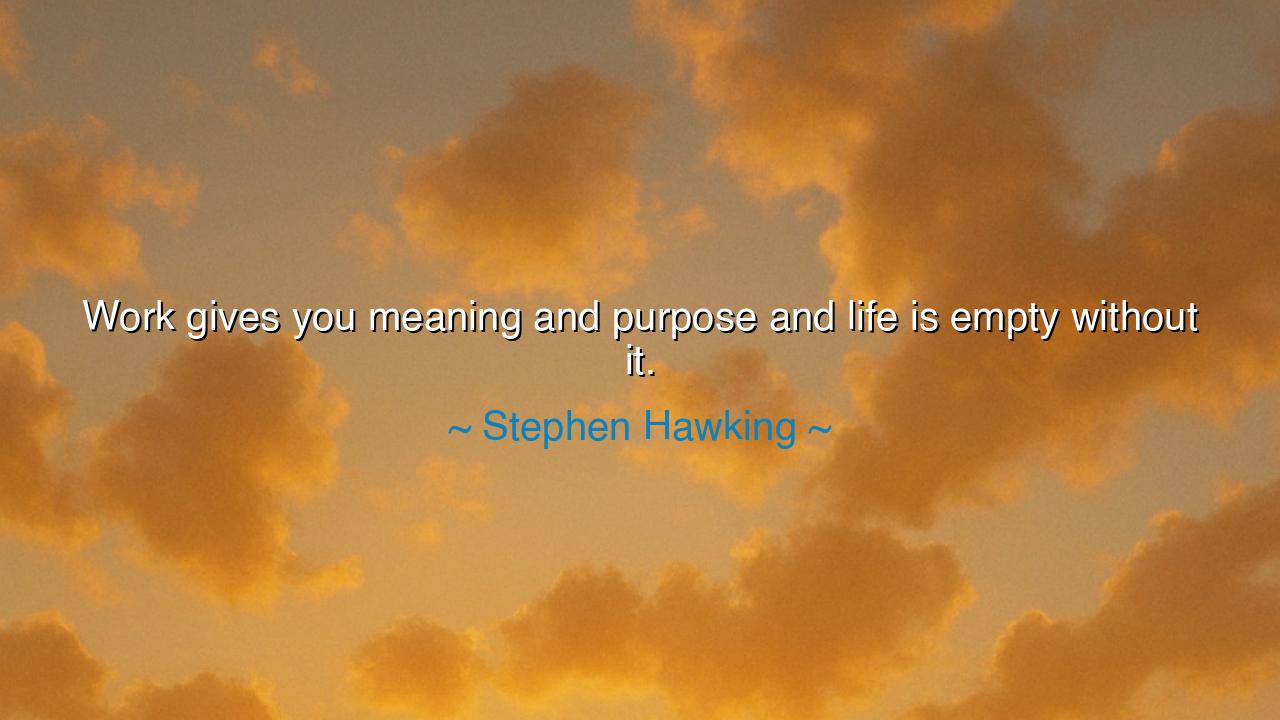
Work gives you meaning and purpose and life is empty without it.






Stephen Hawking, the great voyager of the cosmos whose body was bound but whose mind soared beyond the stars, once spoke with unwavering conviction: “Work gives you meaning and purpose and life is empty without it.” These words are not the musings of one untouched by hardship, but the living testament of a man who, though struck by illness and confined to a chair, still found boundless purpose in his labor. He teaches us that the weight of existence is not carried by comfort or leisure, but by the fire of work—the steady pursuit of something greater than the self.
The meaning of this teaching is clear: work is more than toil, more than the earning of bread or the keeping of routine. True work is the expression of one’s gifts, the pouring forth of effort into tasks that give shape to the soul. It may be the labor of the scholar, the artist, the builder, the mother, or the servant—it matters not the form, but the spirit. When man works with heart and intention, his days become filled with purpose. When he ceases to work, when he drifts without aim or task, then life becomes hollow, a shell without song.
The origin of Hawking’s words lies in his own struggle. Stricken with ALS as a young man, he was told his life would soon be over. Yet rather than surrender to despair, he turned to work. Through his studies of black holes, time, and the nature of the universe, he found not only knowledge but also meaning. His body weakened, but his work gave him strength; his voice faltered, but his purpose grew louder than any silence. From his life we see this truth: purpose sustains when flesh fails.
History offers us other radiant examples. Consider Helen Keller, born blind and deaf, locked away from the world of sound and sight. Yet through relentless effort and the guidance of her teacher, she found her voice and spent her life laboring as a writer and advocate for the disabled. She worked with unyielding devotion, and through that work she turned a life of potential emptiness into one filled with eternal light. Her story, like Hawking’s, proves that work transforms limitation into meaning.
On the other hand, history warns of the emptiness of idleness. Rome, at the height of its empire, grew decadent, its people abandoning labor for leisure, its leaders indulging in excess while the structures of duty crumbled. In time, without meaningful work to hold them steady, their society decayed. Here we see the shadow side of Hawking’s truth: when work is abandoned, life itself—whether of a person or a nation—becomes hollow and collapses.
O children of tomorrow, hear this wisdom: do not despise work, nor seek to escape it as though it were a curse. See it as the sacred tool that gives meaning to your days. Even the smallest tasks, if done with love and diligence, add weight and purpose to your existence. Let your work be more than survival; let it be the reflection of your gifts, the testimony of your endurance, and the offering of your soul to the world.
The lesson is plain: embrace work as the root of meaning. Do not wait for greatness to knock at your door—begin in what lies before you. Do your labor well, whether humble or grand, and in it you will find the purpose that sustains you through hardship, through joy, and even through suffering. Work with heart, and life will never be empty.
Thus let Stephen Hawking’s words endure like a beacon: “Work gives you meaning and purpose and life is empty without it.” Treasure these words, and let them guide you. For though strength may fail and fortune may fade, the work of your hands and the labor of your spirit will carry you into a life not of emptiness, but of fullness and eternal worth.






AAdministratorAdministrator
Welcome, honored guests. Please leave a comment, we will respond soon